Janja Garnbret, Olympic Champion Interview
At a launch event in London for the release of the The Wall: Climb for Gold on Netflix UK, we spoke to Olympic Champion Janja Garnbret about Tokyo 2020, her relative strengths and weaknesses and her future plans.
Janja Garnbret says her life hasn't changed much since winning Olympic Gold at Tokyo 2020, although some people recognise her in the local supermarket and request autographs.
Janja Garnbret: Olympic Champion. © Natalie Berry
The Games may not have turned the 23-year-old Slovenian into a household name, but given that we're meeting in a 5-star London hotel for a Netflix launch of a feature-length film showcasing four climbing Olympians, it's clear that both Garnbret and the sport itself have stepped somewhat out of the shadows and into the limelight.
In the boutique hotel foyer, there's modern art and plush sofas and a cocktail bar. A stone's throw from Soho and Denmark Street, it's all very rock and roll.
"Are you staying here?" I ask Garnbret. "Yes!" she replies shyly, with a look of both disbelief and amusement. When asked what she'd like to drink from the bar, Garnbret goes all-out and asks for an orange juice. She is an athlete, after all.
An athlete with one Olympic Gold medal, six World Championship titles, 32 World Cup wins and nine overall World Cup titles. An athlete considered by many to be the 'GOAT' (Greatest Of All Time) and 'The Queen' of competition climbing.
Even as a toddler and young child, Garnbret exhibited extraordinary athletic ability and a distinct lack of fear. In The Wall: Climb for Gold, archive footage shows a young Garnbret dancing and moving energetically. In a later clip, she bridges high up a doorframe, grasps the top of it and walks her feet over her head in a somersault-like spin. Then, she does it again.
"I was a really hyperactive child," Garnbret tells me. "I just wanted to do everything. I was climbing on doorframes and trees — everywhere!" While her parents didn't climb, Garnbret's mother rollerskated and competed recreationally and her father enjoyed cycling. "They were active but not pro athletes, so I don't know how I came out... like this!" she laughs. "But they took me everywhere when I started climbing, to every competition. They were super supportive."
I feel like I'm not at my peak yet. I can still improve in all aspects
of climbing. I don't think I will ever get bored of competitions!"
In footage from a youth competition, Garnbret struggles to reach a finish hold over the lip of a roof. In an astounding movement that mimics her ingenuity on the doorframe, Garnbret inverts and extends her leg above her head, toe-hooking the hold and lifting her body upwards to grasp it with both hands.
Eventually, her parents explain in the film, young Garnbret had to choose one activity to focus on: dancing or climbing. She picked climbing, of course, but her dancer's understanding of rhythm and artistic flair would nonetheless continue to influence her climbing movement. Garnbret's signature 'Janja flick' or 'scorpion' - where she dramatically arches her spine and free-hanging limbs backwards and rotates around contact points to dampen a swing - is now part of the sport's repertoire and analysed and replicated worldwide.
These showstopping acrobatics evolved as Garnbret shifted between disciplines. "Over the years, my climbing style changed a lot," she says. "When I came onto the scene in 2015, I was more of a static and slower climber as I was focusing mostly on Lead. In 2017, I started competing in bouldering and something clicked. I became more dynamic."
A "fun fact", she explains, is that she doesn't remember consciously learning coordination moves — arguably her trump card in competitions, where she dances across volumes with ease. "I guess I had it in me, I guess that was just something fun for me," she says modestly, somewhat distancing herself from her talent. "I didn't need much time to learn. I guess it came naturally to me."
Dealing with the expectation of winning, though, was something Garnbret had to take time to learn from a young age. Her first competition was a European Youth Championship in Grindelwald in 2013. "I won there, so ever since I feel like when I'm competing, I have to win," she says. "I have to perform my best, I shouldn't have a bad day."
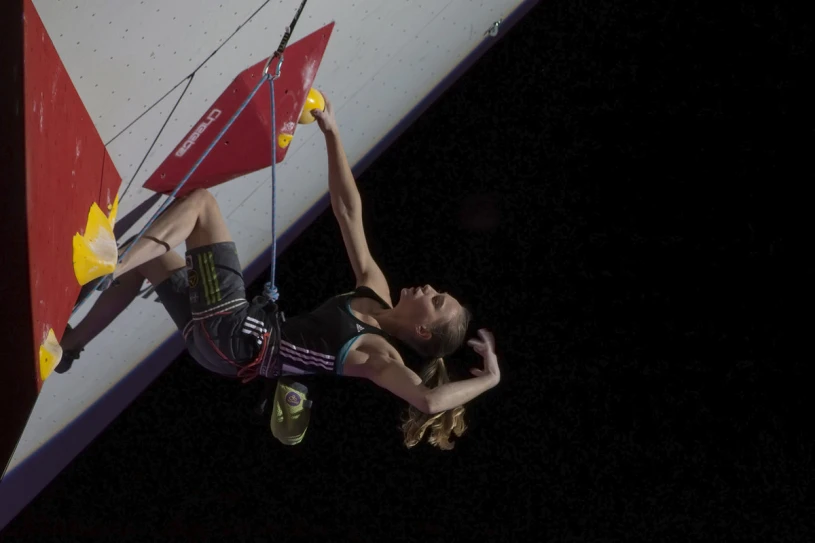 Janja Garnbret enters the senior circuit at the Chamonix World Cup, 2016 © Björn Pohl
Janja Garnbret enters the senior circuit at the Chamonix World Cup, 2016 © Björn Pohl
With each further win, people expected Garnbret to keep on winning. "That's not necessarily a pressure, as I try to take it as a positive that people believe that I'm capable of winning every competition," she says. "Sometimes you feel tired, you don't have the best day, but then I remember my parents, my friends just believing in me."
Garnbret is her own harshest critic. In the film, she claims that her biggest obstacle is her mind. "Most of the pressure actually comes from me because I have high expectations to perform at my best at every competition, but also at every training session," she tells me. "I expect to have the best day every day, but we all know this is not possible. I try to be patient and more gentle with myself because sometimes I just feel exhausted. I'm still learning!"
She's a self-confessed perfectionist. "I want everything to be perfect, I want to be better than I was yesterday and than I was in previous years," she says. "I want to improve this and that, I just want to be the best overall climber possible and I think my perfectionism brought me where I am today, because if I wasn't hard on myself, maybe I wouldn't be where I am today."
But on the other hand, I posit, being Janja Garnbret must be a hard act for her own self to follow. "Perfectionism can slow your progress because sometimes, you should be more gentle on yourself and not push yourself too much," she says. "Sometimes I don't know how to do that because I put too much pressure on myself. You need to find the perfect balance between being patient and trying to be perfect."
In the film, Garnbret's coach, Roman Krajnik, appears to speak the same language of movement and share the same no-nonsense intensity and attention to detail as Garnbret. "We started working together at the end of 2019, but it felt like we'd been doing it for 15 years," she says. "We both have the same energy. He pours his heart out for training, and so do I, so those two energies can create something magical."
Krajnik has helped Garnbret with mental training in particular, since she does not work with a sport psychologist. In the film, a scene shows Garnbret failing to complete a complex coordination boulder in training. "It's like I'm climbing stupidly!", Garnbret spits after a slip. Krajnik teases out her frustration and chides her negative self-talk: the "I can't!"'s and the "No!"'s. He counters her complaints with directness and dry humour. "Hey, I think your phone fell on the floor," he jests after she makes a slightly huffy exit from the training room.
He also assists Garnbret with technical skills. "I'm not so good at slabs so we've been working a lot on that, and movement and route climbing — on everything!" she says. Moreover, training with her world-class Slovenian teammates is like being at a 'mini World Cup.' "We have so many strong women who can compete for podium places," Garnbret says, "so you get a comparison at nationals or team training and it's great when we push each other."
In the stress of 2019 - the Olympic selection season - back-to-back competitions and high stakes led to some aberrations in Garnbret's results. After her historic clean-sweep of the Boulder World Cup circuit, Garnbret stumbled in the Chamonix Lead World Cup, just weeks ahead of the Hachioji World Championships Olympic selection event. She failed to make a Lead final for the first time ever, stunning the crowd into silence.
"I feel like you always learn more from your failures than your wins," she says. "In Chamonix, I didn't really know what the reason was. Maybe it just wasn't my day, or maybe since 2019 was the season when I won all Boulder World Cups then I won the first Lead World Cup, I felt like I could win every single competition that season and maybe I put too much pressure on myself in Chamonix, because I really wanted to perform."
This was an example of her perfectionism functioning "the other way around," she says. While Garnbret's "failures" - finishing somewhere in the top 10 at World Cup level - would be a personal best for most competitors, these blips often generate more discussion than her successes. "From a young age, everybody had the assumption that I'm just naturally good, that I don't have any self-doubt, that I don't have any problems [...] I always had the feeling that when I have problems I shouldn't have them," she says in the film.
Despite having won three gold medals in the Hachioji World Championships and earned her Olympic ticket, Garnbret experienced another glitch at the end of the Lead season in Kranj, in front of a home crowd.
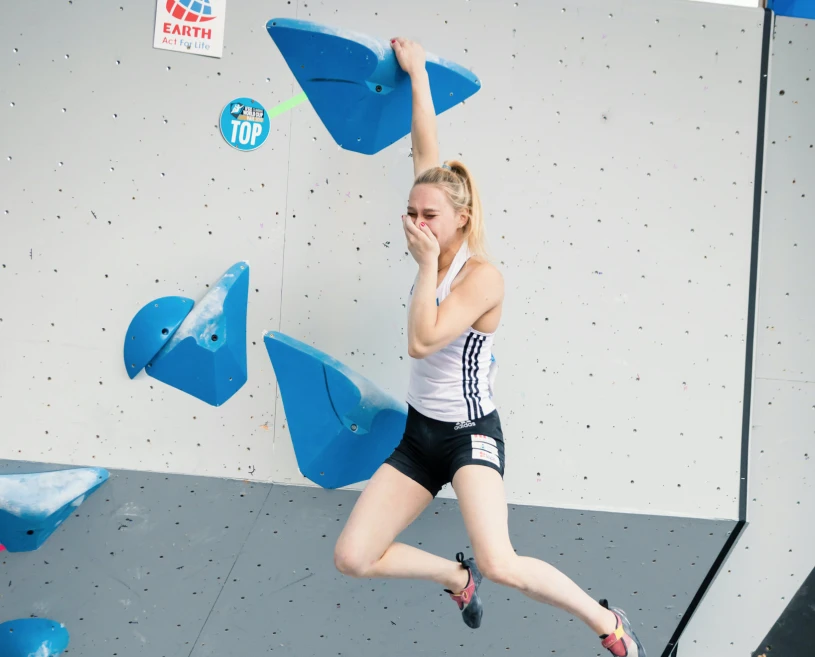 Janja Garnbret: an emotional end to her clean sweep of 6 World Cups. © Dark Sky Media
Janja Garnbret: an emotional end to her clean sweep of 6 World Cups. © Dark Sky Media
"In Kranj I definitely felt tired because it was one of the last competitions of the season and it was a home crowd and home pressure," she tells me. "It's always hard to compete in Kranj because you always want to perform your best and people expect you to, so I learned that you can have a bad day, because up until 2019 I didn't miss a single Lead final, so it was inevitable. I learned that it can also happen to me!"
"...and that you're human?" I say. "Yeah!" she laughs.
In the film, Krajnik describes people's tendency to consider Garnbret 'a superhuman': "Everyone is saying she's perfect, that she has no weaknesses," he says. In the final two Lead events of 2019, she finished 4th and 2nd. Following her rollercoaster season, Garnbret had lost her confidence. She turned to Krajnik for advice.
Throughout 2020, struggling with a dearth of competitions, the pair worked on solving her mental problems. "If it's too easy, she loses her focus," Krajnik says in the film. "She could easily make a stupid mistake and that could also happen at the Olympics. I hope not, but there's a big chance [...] If you're not all-in, even if you're Janja it's not enough."
In the months before Tokyo, with the added stress of a COVID delay, the pressure would only increase. "It was insane," Garnbret recalls. "If I ever said that I was under pressure in a World Cup or World Championships, the Olympics were a different story. You really felt how big the Olympics are."
To minimise stress, Garnbret shielded herself from all hype, analysis and comment. "Number one thing: I didn't read anything. Before the Olympics, I didn't read any magazine, any single news report — nothing," she says. "I already felt the pressure in anything I was doing, even just walking to the shops — it was insane!"
As one of the last Olympic events to take place, Garnbret felt added tension in the lead-up to qualifiers. "We were in the Olympic Village three days before our competition and everybody was walking around with medals and celebrating and I hadn't even started competing yet," she says. "That was tough mentally. I think I just had to break the ice and have qualifications and then it would be smooth sailing from there."
A rough start with a slip in Speed qualifiers and a 14th place proved to be the ice-breaker Garnbret perhaps didn't expect or want, but very much needed.
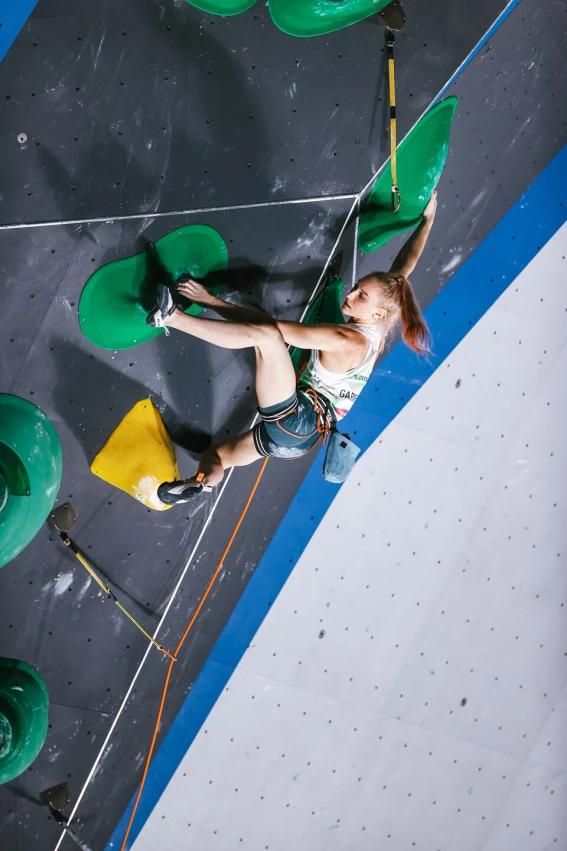 "I was crying so hard after my two speed runs," she says. "I said to Roman: 'I trained for two years to get 10 seconds on the Speed run!' I was pissed and frustrated with myself." After a pep-talk from Krajnik, Garnbret gathered herself together and flashed all four Boulders. "That was probably because of my frustration and anger — I showed that in the Boulder round."
"I was crying so hard after my two speed runs," she says. "I said to Roman: 'I trained for two years to get 10 seconds on the Speed run!' I was pissed and frustrated with myself." After a pep-talk from Krajnik, Garnbret gathered herself together and flashed all four Boulders. "That was probably because of my frustration and anger — I showed that in the Boulder round."
Having released the pent-up tension, Garnbret was in 1st place and in the right mood for finals. "When I woke up in the morning I felt different, I felt in the zone already and I was just ready to go all-in," she says. "If you ask me what I was thinking when I was competing in the finals, I wouldn't know because I was in my own bubble, in my own world and I don't remember a thing!"
"Oh...That was my next question!" I say. Garnbret laughs. Gradually, the blur begins to sharpen into focus.
"I was super tired from Speed and Boulder, but not physically, more mentally because the competition lasts so long," she continues. "You had to be fully focused to compete, then go to the warm-up zone, and repeat. Before my lead route, I was listening to music and thinking 'Just this one last route and then you're done!' I just wanted to be done with the Olympics. My mind was at peace. I knew what I had to do. I said 'You need to have fun!'. I'm always repeating that, but I know that I give my best performance when I'm having fun. I started climbing and I was at peace."
High on the Lead route, Garnbret - normally fast-paced and dynamic, climbing with abandon - paused to rest for an uncharacteristically long time. Watching from the ground in Tokyo, I wondered what was going through her mind at that point. "I had no idea where I was placed, I was just trying to get as high as possible," she says.
Garnbret felt that the route was difficult, and that athletes were climbing more conservatively given the high stakes. "If that same route was in a World Cup final, we would have different climbing," she explains. "The route was top-able, that's for sure. If it was a World Cup, the pressure would be different. Everybody climbed more safely because they wanted to climb high without taking too much risk. I also didn't want to take as much risk. I love taking risks, but I didn't want to take risks there. That's why I was shaking-out more than usual. When I fell I remember that I was happy — I knew I gave my best as I was tired."
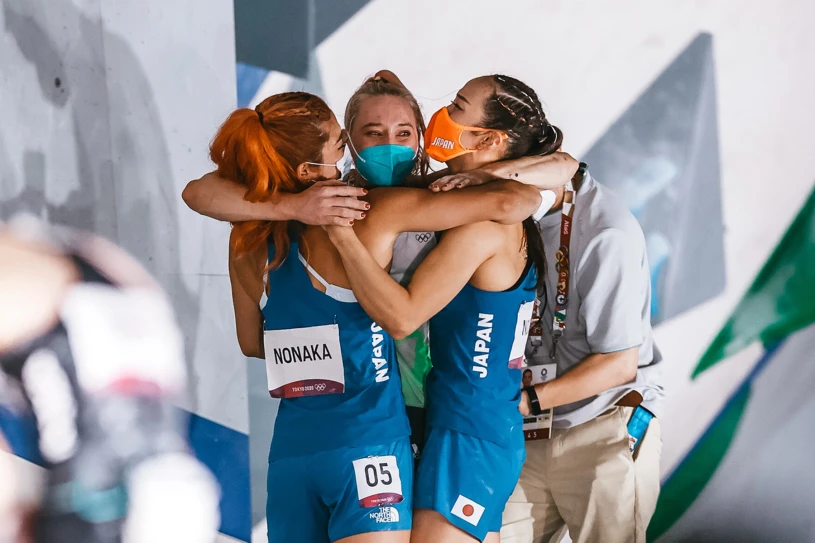
The podium trio celebrating after the result became clear © Jon Glassberg / Louder Than 11
Relieved to have finished, but with two athletes yet to climb and the results inconclusive, Garnbret faced an anxious wait.
"When Miho fell I knew that I had won, but I couldn't really realise that I had actually done it because Chaehyun Seo was still climbing after Miho," she remembers. "I was sitting there waiting and then I started crying because I actually realised that I won." Garnbret was thrilled to share the podium with two friends. "I think this was the best podium ever, Akiyo ending her career with a medal and Miho was also injured before the Olympics. It was so great for us to be together on the podium."
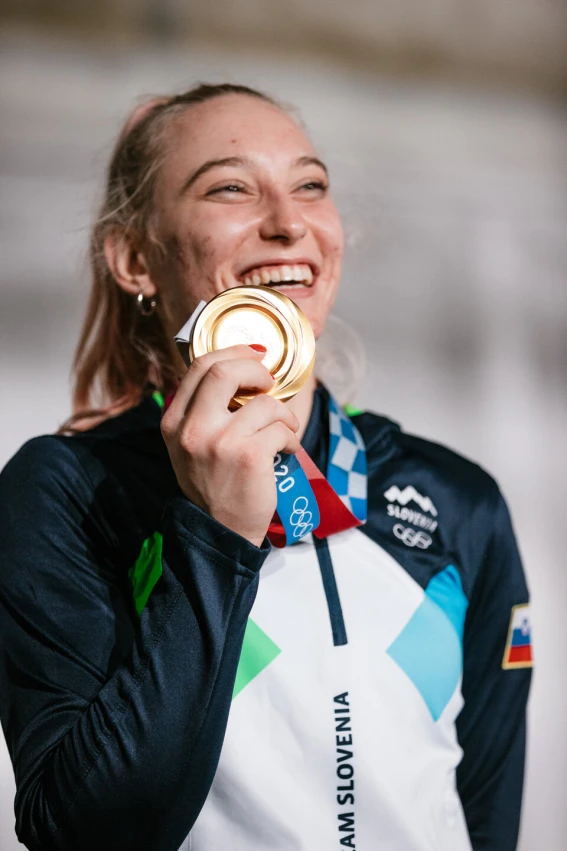 What was it like to stand on the podium, with Sport Climbing's first Olympic Gold medal around her neck?
What was it like to stand on the podium, with Sport Climbing's first Olympic Gold medal around her neck?
"It felt surreal," she says. "The medal weighs half a kilo. So it's a proper medal and it's really amazing to have it!"
At the end of the film, Garnbret is shown placing the medal in her jam-packed but neatly organised trophy cabinet ("I'm a little bit OCD!"), where it takes pride of place. "Perfect!' she says before smiling into the camera.
After all the expectation from herself and others, Garnbret is astonished that she didn't crumble on the world's biggest sporting stage. "Every time I reflect on the last year, I find it crazy that I actually won the competition, because we all know stories of athletes winning every single World Cup before the Olympics and then at the Olympics... stuff happened!" she says. "I find it even more fascinating that I actually handled the pressure."
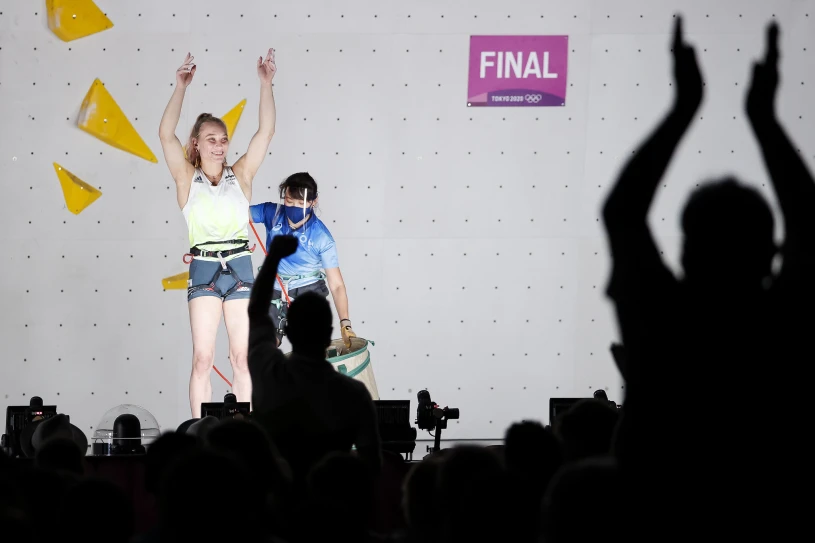 Onlookers celebrate Janja Garnbret's performance. © Dimitris Tosidis/IFSC
Onlookers celebrate Janja Garnbret's performance. © Dimitris Tosidis/IFSC
Despite the unusual atmosphere with no spectators due to COVID, Garnbret believes that these circumstances helped her performance. "I I could take it as just another training competition," she says. "Of course with spectators it would have been even more amazing because the atmosphere would have been great, but without a crowd I felt like I could be more focused and just do my thing."
In watching The Wall, Garnbret appreciated the behind-the-scenes look at the stories of Shauna Coxsey, Brooke Raboutou and Miho Nonaka. "I really enjoyed watching the film because every everybody knows each other, but nobody knows what's behind everything and it's not always as it seems," she says. "We were all working towards the Tokyo Olympics, but we had very different stories: Miho was injured just before the Olympics, Shauna was dealing with injuries and she was at the end of her career, Brooke is just starting her career and I had to win, basically."
She also acknowledges the unique opportunity the film presents to showcase competition climbing. "We have many rock climbing videos, but we have never had a movie dedicated to competitions," she says. "With the Olympics, it was the best opportunity to do it."
Teary-eyed during the screening, Garnbret finds watching the rollercoaster Olympics scenes - complete with real-time footage of family watch-parties - a moving watch. "This is the seventh time I've watched the film and I still get emotional!", she says.
Winning the Olympics can be a life-changing event for athletes. Not for Garnbret. "My personal life hasn't changed, I'm still the same as I was 10 years ago!" she laughs. "I maybe have more sponsorship opportunities, endorsements and things like this [she gestures to reference our interview], but otherwise it hasn't changed a lot."
But back home in Slovenia, things have changed dramatically for the sport — largely thanks to her success. "Everybody knows about climbing now," Garnbret says. "10 years ago, when I said that I climb, people said "Oh, is that like alpinism? What even is that?" Now everybody knows the difference between all three disciplines and all the rules. All the clubs are full and there's a waiting list of 150 kids just to join a club."
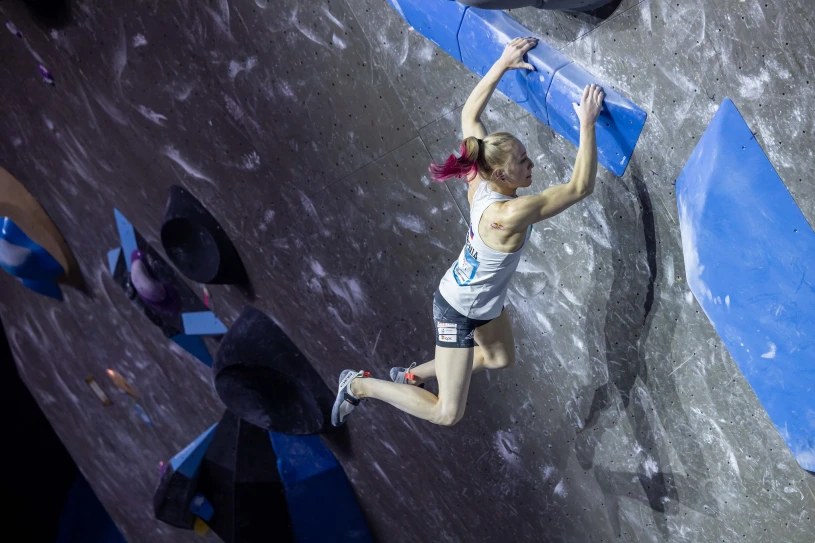
Janja Garnbret wins in Meiringen 2022. © Jan Virt/IFSC
Returning to the competition circuit as Olympic Champion this year, Garnbret remained humble and didn't expect to win the Boulder World Cup in Meiringen last month. "I was super emotional in Meiringen, and I was also surprised," she said. "I don't take any wins for granted and also I try not to compare my accomplishments to the previous season because if you win once, it doesn't mean you will win in the next season because new competitors arrive and anything can happen. I'm super grateful that I can still be the best."
Fans were disappointed by Garnbret's announcement that she will not compete in any further Boulder World Cups this year, and instead focus on Lead and World Championship events and rock climbing. "I need a break from competitions because the Olympics really did take a toll on my mental and physical health," she says. "But I also have some rock climbing projects and this is a perfect time to try those."
Garnbret became the first woman to onsight 8c shortly after the Games (UKC News), ticked Bügeleisen 8B+ in March and has been working La Dura Dura 9b+ in Oliana, Spain. If she completes it, she'll be the first woman to climb the grade.
"It is hard — hard hard!" she laughs, playing on the Spanish translation of the line. "I hope that it will go. I did all the moves. One move in the middle is a bit problematic. It's super reachy. It's not in the lower crux, but in the middle of the route, where Chris and Adam jump, I have to jump jump! I'm looking for a challenge and I feel like La Dura Dura is the perfect one for me. It's something that I would have to put a lot of effort into."
Next year, qualification begins for Paris 2024. "I always have Paris in mind and it's really important to pick the right competitions because I want to be in Paris 100% focused and motivated," she says. "I don't want to be in Paris tired from the previous seasons. Even though it seems far away now, it will be here fast!"
I wonder why Garnbret has chosen to focus on Lead alone. "I feel like I haven't reached my potential in Lead yet," she says. "I was always good in Lead but I've never had the feeling I have in bouldering of being super, super confident." Garnbret last won the Lead overall title in 2018, the last season when "everybody was doing all of the competitions" ahead of Tokyo and COVID disruption. "I think this year everybody will compete and I'm really looking forward to doing the whole season again."
With new names nipping at her heels, such as Natalia Grossman and Oriane Bertone, Garnbret may have more of a fight on her hands. "Youngsters have to come," she says. "It feels weird, because some years ago I was 15 and just coming up and Shauna was 24 and now it's the other way around. It's super fun to see that they can keep up. It feels great to get a slap in the face sometimes by youngsters!"
But is she still Speed climbing?
"I actually went back to the Speed wall a month ago," Garnbret laughs. "I was just curious to see if I remember everything and I was really good, so Roman said that I should train speed!"
Many say that Garnbret has 'achieved all there is to achieve' in competition climbing. She disagrees.
"No! I still haven't won a European Championships," she says. "And yeah, I'm not done yet! I still find motivation in that. I can't be better than first, but I have a lot of potential to work on my mental training. I feel like I'm not at my peak yet. I feel like I can still improve in all aspects of climbing. I don't think I will ever get bored of competitions!"
At the end of the film screening, Garnbret is presented with a bouquet to thank her for her time and effort in participating in its production alongside the demands of training for the Games. She's ushered into a room for more drinks and networking. Everyone wants to know whether she will climb in London and where, but she's travelling back home the next morning.
For Garnbret, there's always work to be done, climbs to be ticked and more competitions to be won.